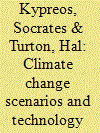| Srl | Item |
| 1 |
ID:
110579


|
|
|
|
|
| Publication |
2011.
|
| Summary/Abstract |
We apply a specific version of MERGE-ETL, an integrated assessment model, to study global climate policies supported by Technology Transfer Protocols (TTPs). We model a specific formulation of such a TTP where donor countries finance via carbon tax revenues, the diffusion of carbon-free technologies in developing countries (DCs) and quantify its benefits. Industrialized countries profit from increased technology exports, global diffusion of advanced technology (leading to additional technology learning and cost reductions) and reduced climate damages through the likelihood of greater global participation in a new international agreement. DCs experience increased welfare from access to subsidized technology, and profit from the reduction of damages related to climate change and expected secondary benefits of carbon abatement (such as reduced local and regional air pollution). The analysis identifies potential candidate technologies that could be supported under a TTP, and the impact of a TTP on economic development (including the flow of transfer subsidies) and global emissions. Although a TTP may encourage additional participation, such a proposal is only likely to be successful if an increased willingness to pay to avoid climate damages is accepted, first by the present and future generations of the industrialized world and later on, when sufficient economic growth is accumulated, by today's developing countries.
|
|
|
|
|
|
|
|
|
|
|
|
|
|
|
|
| 2 |
ID:
112316


|
|
|
|
|
| Publication |
2012.
|
| Summary/Abstract |
As the Copenhagen Conference of Parties (COP) failed to negotiate a binding Post-Kyoto agreement, an alternative is proposed based on the Copenhagen Accord (CA). The CA, as endorsed by COP16 in Cancun, aims to combat global warming with differentiated reduction targets of greenhouse gas emissions and by mobilizing resources supporting adaptation and carbon-free technology in developing countries (DCs). Using a special version of MERGE, we study the global implications of the CA postulating extensions of the Accord in the direction of Technology Transfer Protocols (TTPs). We assess scenarios needed to reach sustainable climate targets under such Protocols. It is shown that without binding commitments for DCs, the warming target of 2 °C will be exceeded with a probability above 50%, even if Annex B countries eliminate their emissions. However, moderate commitments of DCs (when they reach sufficient economic development), make the 2 °C scenario feasible. TTPs combined with binding emission reduction targets thus provide a mechanism to reduce climate change damages, and may generate significant secondary benefits. For example, the reduced tax-subsidy scenario (RTS20) has 77% to 40% chances to remain below 2 °C of warming and an undiscounted cumulative gross domestic product (GDP) cost of 0.75% relative to baseline (not accounting for the benefits of avoided damages).
|
|
|
|
|
|
|
|
|
|
|
|
|
|
|
|